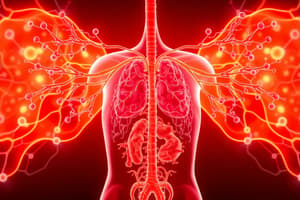Podcast
Questions and Answers
What is the primary role of estrogens in the body?
What is the primary role of estrogens in the body?
Responsible for female sexual development
Which gland produces adrenaline (epinephrine)?
Which gland produces adrenaline (epinephrine)?
Adrenal gland
What is the main function of cortisol in the body?
What is the main function of cortisol in the body?
Involved in stress response and immune system function
Name the glands that are part of the endocrine system.
Name the glands that are part of the endocrine system.
How do hormones act on target cells?
How do hormones act on target cells?
What are the common biological processes regulated by thyroid hormones?
What are the common biological processes regulated by thyroid hormones?
Which hormone is responsible for regulating blood sugar and fat storage?
Which hormone is responsible for regulating blood sugar and fat storage?
What is the function of the pituitary gland?
What is the function of the pituitary gland?
Where are the adrenal glands located?
Where are the adrenal glands located?
What do the female ovaries and male testes produce?
What do the female ovaries and male testes produce?
What is the role of the hypothalamus in the endocrine system?
What is the role of the hypothalamus in the endocrine system?
How are hormone levels regulated in the endocrine system?
How are hormone levels regulated in the endocrine system?
What are some common hormone disorders mentioned in the text?
What are some common hormone disorders mentioned in the text?
What can cause hormone disorders in the endocrine system?
What can cause hormone disorders in the endocrine system?
How does the endocrine system complement the nervous system?
How does the endocrine system complement the nervous system?
What is the function of the thyroid gland?
What is the function of the thyroid gland?
Flashcards are hidden until you start studying
Study Notes
Biology Class 11: Endocrine System
The endocrine system is a complex network of glands that produce hormones, which serve as the body's chemical messengers. These hormones regulate various biological processes, including growth and development, metabolism, electrolyte balances, and reproduction. The endocrine system is made up of glands that produce hormones, such as the hypothalamus, pituitary, adrenal glands, gonads, and thyroid.
Hormones
Hormones are released into the bloodstream and act on target cells with compatible receptors. Over 50 hormones have been identified in humans and other vertebrates. Some common hormones and their roles include:
- Thyroid hormones: Produced by the thyroid gland, these hormones stimulate all cells in the body and control biological processes such as reproduction, development, and metabolism.
- Adrenaline (epinephrine): Produced by the adrenal gland, this hormone is involved in the "fight or flight" response and regulates metabolism and immune responses.
- Cortisol: Also produced by the adrenal gland, cortisol is involved in stress response and immune system function.
- Estrogens: Primarily produced by the ovaries, these hormones are responsible for female sexual development.
- Androgens: Produced mainly by the testicles, these hormones are responsible for male sex characteristics.
- Insulin: Produced by the pancreas, insulin regulates blood sugar and fat storage.
- Glucagon: Also produced by the pancreas, this hormone regulates blood sugar levels.
Endocrine Glands
The endocrine system includes several glands that produce hormones, such as:
- Hypothalamus: Located in the brain, the hypothalamus produces several releasing and inhibiting hormones that act on the pituitary gland.
- Pituitary gland: Often called the "master gland," the pituitary gland produces hormones that control many other endocrine glands.
- Adrenal glands: Located above the kidneys, these glands produce hormones like adrenaline and cortisol.
- Gonads: The female ovaries and male testes produce hormones like estrogens and testosterone, which are responsible for sexual and reproductive development.
- Thyroid gland: Located in the neck, the thyroid gland produces hormones that regulate metabolism and other biological processes.
Feedback Mechanisms
The endocrine system is regulated by negative feedback mechanisms that work to maintain homeostasis. These mechanisms ensure that the concentration of hormones within the body remains within a relatively narrow range. Positive feedback loops cause the concentration of a hormone to become increasingly higher, while negative feedback loops help keep the hormone levels within a relatively narrow range.
Hormone Disorders
Hormone disorders can occur when the endocrine system is unable to produce or regulate hormones effectively. These disorders can result from various factors, such as stress, infection, or changes in the balance of fluids and minerals in the blood. Some common hormone disorders include thyroid disorders, diabetes, and hormonal imbalances that can affect growth, development, and reproduction.
Endocrine System Regulation
The endocrine system is a regulatory system that works in conjunction with the nervous system to maintain homeostasis and control various physiological processes. While the nervous system acts quickly by delivering messages through nerve impulses, the endocrine system has a slower but longer-lasting response, which complements the nervous system. The endocrine system is essential for the proper functioning of the body, and maintaining its balance is crucial for overall health and well-being.
Studying That Suits You
Use AI to generate personalized quizzes and flashcards to suit your learning preferences.




